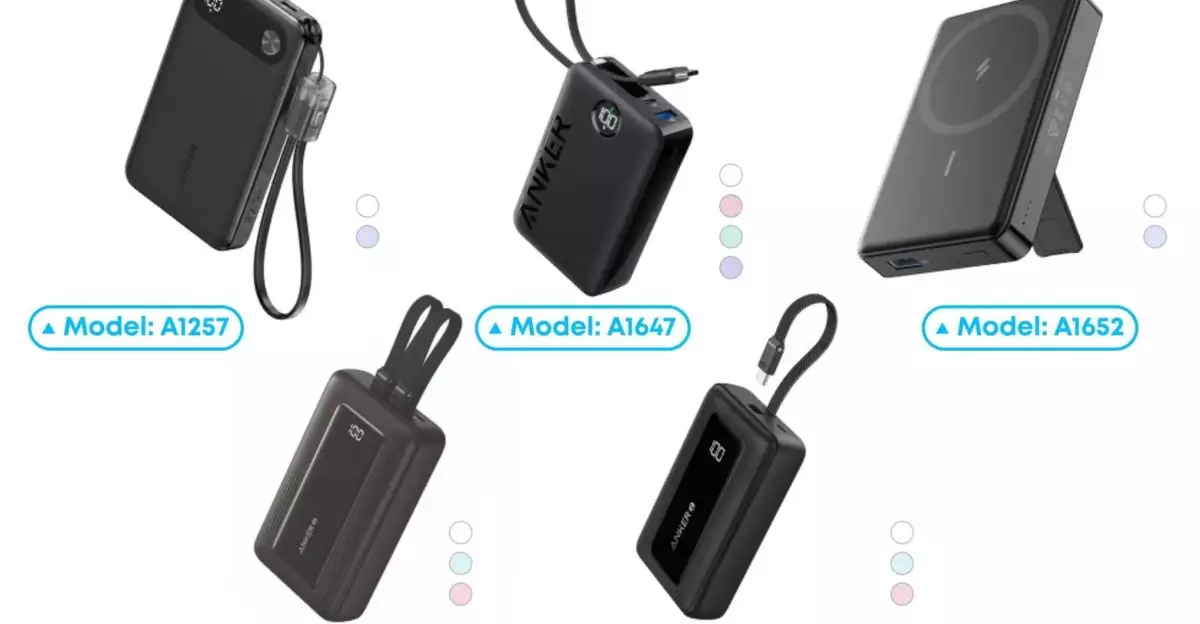In a surprising yet concerning move, Anker, a brand synonymous with portable power solutions, has announced a global recall of several of its power bank models, including the popular MagGo and Zolo series. While these devices are generally celebrated for their reliability, recent reports have highlighted a serious oversight that compels users to reassess their trust in the company. This recall comes on the heels of a previous one concerning the model A1263 PowerCore 10000, illuminating an unsettling pattern of lithium-ion battery issues linked to Anker’s manufacturing processes. With memories of exploding devices ever-present in the consumer electronics industry, this situation underscores the need for vigilance when it comes to our daily gadgets.
The Risks Involved
Anker’s announcement cites risks of overheating, melting, smoke, or even fire, which undeniably sends chills down the spine of tech enthusiasts and average consumers alike. Anker rationalizes its decision as a precautionary measure, emphasizing that the likelihood of malfunction is minimal. However, such reassurances can come off as hollow when juxtaposed against alarming statistics; the US Consumer Product Safety Commission (CPSC) has already gathered reports of 19 separate incidents involving fires and explosions related to the previous model recall. The gravity of the issue raises serious questions about consumer safety and corporate responsibility.
Consumer Response and Company Accountability
As Anker provides affected customers in the US with the option of a free replacement or a gift card, one can’t help but wonder whether these reparative measures are enough to soothe the anxieties of end users. Disposing of potentially dangerous lithium-ion batteries is no straightforward task. Anker urges customers to refrain from discarding the products in general trash or recycling bins, instead directing them to hazardous waste facilities equipped to handle such items. This raises an interesting dilemma; while the company is conducting a voluntary recall, the burden of safe disposal falls largely on the shoulders of consumers. Are they adequately informed about how to responsibly handle a product of this nature?
The Broader Implications
The ongoing issues with Anker’s power banks serve as a critical reminder of broader trends in the tech industry, particularly concerning quality control and supply chain management. With many tech companies leaning heavily on third-party suppliers for crucial components like batteries, the risk of flaws inevitably increases. The reliance on lithium-ion technology, while predominant in modern electronics, comes with its pitfalls. Manufacturers must continually evolve and prioritize not just innovation, but safety, which should not be an afterthought. Anker’s situation begs the question: is profitability being valued over safety?
The Opportunity for Change
Despite the disconcerting news, this could be a pivotal turning point for Anker, offering an opportunity for improvement. Transparency about supply chain oversight and quality assurance can help rebuild consumer trust. Furthermore, ensuring rigorous testing and adhering to safety guidelines can reinforce Anker as a leader not merely in product offerings but also in consumer safety. If companies can learn from such missteps, the ramifications could extend beyond just brand reputation. They could lead to industry-wide reforms, establishing more robust safety protocols that protect users from potential hazards.
Advice for Consumers
For consumers who own affected power banks, the situation demands immediate action. Checking the model numbers and verifying whether your device falls under the recent recall is essential. It’s not just about replacing a faulty product; it’s about safeguarding your environment and your loved ones from potential dangers. Consumers must stay informed and proactive, especially in an age of rapid technological advancement. Companies like Anker thrive on user loyalty, and it is high time consumers assert their expectations for accountability and safety.
Anker’s situation reveals much more than just a recall—it’s a litmus test of consumer safety practices in a fast-paced tech market. As awareness of these issues rises, the industry must adapt or risk losing the trust of the very people it aims to serve.

